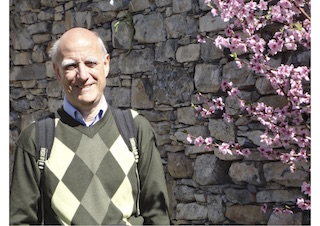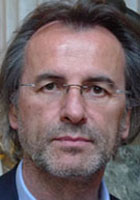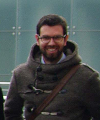Studiare
In questa sezione è possibile reperire le informazioni riguardanti l'organizzazione pratica del corso, lo svolgimento delle attività didattiche, le opportunità formative e i contatti utili durante tutto il percorso di studi, fino al conseguimento del titolo finale.
Calendario accademico
Il calendario accademico riporta le scadenze, gli adempimenti e i periodi rilevanti per la componente studentesca, personale docente e personale dell'Università. Sono inoltre indicate le festività e le chiusure ufficiali dell'Ateneo.
L’anno accademico inizia il 1° ottobre e termina il 30 settembre dell'anno successivo.
Calendario didattico
Il calendario didattico indica i periodi di svolgimento delle attività formative, di sessioni d'esami, di laurea e di chiusura per le festività.
| Periodo | Dal | Al |
|---|---|---|
| Sem. IA | 1-ott-2014 | 16-nov-2014 |
| Sem. IB | 17-nov-2014 | 18-gen-2015 |
| Sem. IIA | 23-feb-2015 | 19-apr-2015 |
| Sem. IIB | 20-apr-2015 | 7-giu-2015 |
| Sessione | Dal | Al |
|---|---|---|
| Sessione Estiva (Esami sospesi dal 14 al 16 luglio) | 8-giu-2015 | 31-lug-2015 |
| Sessione Autunnale | 1-set-2015 | 30-set-2015 |
| Sessione Invernale | 18-gen-2016 | 21-feb-2016 |
| Sessione | Dal | Al |
|---|---|---|
| Sessione Estiva | 14-lug-2015 | 16-lug-2015 |
| Sessione Autunnale | 10-nov-2015 | 12-nov-2015 |
| Sessione Invernale | 14-mar-2016 | 17-mar-2016 |
| Periodo | Dal | Al |
|---|---|---|
| Festa di Ognissanti | 1-nov-2014 | 1-nov-2014 |
| Festa dell'Immacolata Concezione | 8-dic-2014 | 8-dic-2014 |
| Vacanze Natalizie | 22-dic-2014 | 6-gen-2015 |
| Vacanze Pasquali | 2-apr-2015 | 7-apr-2015 |
| Festa della Liberazione | 25-apr-2015 | 25-apr-2015 |
| Festa dei lavoratori | 1-mag-2015 | 1-mag-2015 |
| Festa del S. Patrono S. Zeno | 21-mag-2015 | 21-mag-2015 |
| Festa della Repubblica | 2-giu-2015 | 2-giu-2015 |
| Vacanze Estive | 10-ago-2015 | 16-ago-2015 |
Calendario esami
Gli appelli d'esame sono gestiti dalla Unità Operativa Segreteria Corsi di Studio Scienze Umane.
Per consultazione e iscrizione agli appelli d'esame visita il sistema ESSE3.
Per problemi inerenti allo smarrimento della password di accesso ai servizi on-line si prega di rivolgersi al supporto informatico della Scuola o al servizio recupero credenziali
Per dubbi o domande leggi le risposte alle domande più frequenti F.A.Q. Iscrizione Esami
Docenti
 alex.arcozzi@univr.it
alex.arcozzi@univr.it

Avezzu' Guido
 guido.avezzu@univr.it
guido.avezzu@univr.it
 augusto.barbi@univr.it
augusto.barbi@univr.it
 alberto.cavarzere@univr.it
alberto.cavarzere@univr.it
 daniela.ceoletta@univr.it
daniela.ceoletta@univr.it

Chiecchi Giuseppe
 giuseppe.chiecchi@univr.it
giuseppe.chiecchi@univr.it
 +39 045802 8117
+39 045802 8117

Mastrocinque Attilio
 attilio.mastrocinque@univr.it
attilio.mastrocinque@univr.it
 +39 045802 8386
+39 045802 8386
 linda.napolitano@univr.it
linda.napolitano@univr.it
 carlotta.salettisalza@univr.it
carlotta.salettisalza@univr.it
 ivan.valbusa@univr.it
ivan.valbusa@univr.it
 lucia.vantini@univr.it
lucia.vantini@univr.it
 gianmaria.varanini@univr.it
gianmaria.varanini@univr.it
Piano Didattico
Il piano didattico è l'elenco degli insegnamenti e delle altre attività formative che devono essere sostenute nel corso della propria carriera universitaria.
Selezionare il piano didattico in base all'anno accademico di iscrizione.
1° Anno
| Insegnamenti | Crediti | TAF | SSD |
|---|
Lingua straniera competenza linguistica liv. b1 (informatizzato)2° Anno Attivato nell'A.A. 2015/2016
| Insegnamenti | Crediti | TAF | SSD |
|---|
Un insegnamento a scelta Uno o due insegnamenti a scelta per un totale di 12 cfuUn insegnamento a scelta per un totale di 6 cfuUn insegnamento a scelta3° Anno Attivato nell'A.A. 2016/2017
| Insegnamenti | Crediti | TAF | SSD |
|---|
Da due a quattro insegnamenti a scelta per un totale di 24 cfuUno o due insegnamenti a scelta per un totale di 12 cfu| Insegnamenti | Crediti | TAF | SSD |
|---|
Lingua straniera competenza linguistica liv. b1 (informatizzato)| Insegnamenti | Crediti | TAF | SSD |
|---|
Un insegnamento a scelta Uno o due insegnamenti a scelta per un totale di 12 cfuUn insegnamento a scelta per un totale di 6 cfuUn insegnamento a scelta| Insegnamenti | Crediti | TAF | SSD |
|---|
Da due a quattro insegnamenti a scelta per un totale di 24 cfuUno o due insegnamenti a scelta per un totale di 12 cfu| Insegnamenti | Crediti | TAF | SSD |
|---|
Legenda | Tipo Attività Formativa (TAF)
TAF (Tipologia Attività Formativa) Tutti gli insegnamenti e le attività sono classificate in diversi tipi di attività formativa, indicati da una lettera.
Storia della filosofia antica (p) (2015/2016)
Codice insegnamento
4S01229
Docente
Coordinatore
Crediti
6
Offerto anche nei corsi:
- Storia della filosofia antica (p) del corso Laurea in Lettere
Lingua di erogazione
Italiano
Settore Scientifico Disciplinare (SSD)
M-FIL/07 - STORIA DELLA FILOSOFIA ANTICA
Periodo
Sem. IIA dal 22-feb-2016 al 24-apr-2016.
Obiettivi formativi
Obiettivi formativi: Oltre a fornire richiami ai principali autori e scuole della filosofia antica, s’intende formare all’uso della terminologia filosofica propria ed insegnare l’uso critico del testo originale, per l’acquisizione di problemi e concetti filosofici centrali.
Prerequisiti: La conoscenza preliminare della storia della filosofia antica (VI sec. a.C.-529 d.C.) è requisito presupposto (chi non avesse tale competenza dovrà acquisirla o migliorare quella che già possiede). Non è richiesta invece, pur costituendo una facilitazione, la conoscenza del greco antico e del latino, poiché i termini in tali lingue saranno sempre traslitterati e tradotti. Sono richieste attenzione all’indagine lessicale e inclinazione alla lettura critica e condivisa del testo filosofico.
Programma
Titolo e contenuto del corso: “L’anima e la città: cura di sé/cura dell’altro ”
Il corso intende esplorare, sulla scorta di passi scelti dei Dialoghi di Platone (Alcibiade I, Repubblica, Timeo), quale rapporto si ponga fra l’anima individuale (psychè) e la struttura statale (pòlis), che cosa legittimi la considerazione in parallelo dell’una e dell’altra, l’omologabilità delle virtù ascritte ad entrambe (sapienza, coraggio, temperanza) e in particolare della giustizia chiamata ad operare in sede individuale come nella dimensione politica.
Com’è stata intesa nell’ermeneutica filosofica contemporanea, soprattutto da Nicole Loraux, ne La città divisa, tale modello?
E in particolare: l’attenzione etica (anima) e politica (città) e soprattutto la cura formativa (paidèia) che entrambe legittimano ed esigono hanno risvolti degni di attenzione e riflessione anche oggi?
Testi d'esame:
a) Parte generale:
-per chi non l’avesse mai studiata: E. BERTI-F. VOLPI, Storia della filosofia: dall'antichità ad oggi, Edizione compatta, 2 voll. indivisibili, Roma-Bari 2007 (dalle origini fino al neoplatonismo compreso);
-per chi ne avesse già qualche conoscenza: B. CENTRONE, Prima lezione di filosofia antica, Roma-Bari Laterza 2015;
b) Dispensa con fotocopie di testi originali e critici, disponibile alle copisterie “La rapida” e “Ateneo”;
c) Testo introduttivo: M. VEGETTI, Guida alla lettura della ‘Repubblica’ di Platone, Roma-Bari Laterza;
d) Testo critico: L.M. NAPOLITANO VALDITARA, Virtù, piacere e felicità nell’etica dei Greci, Verona aemme edizioni 2014 (disponibile presso la Copisteria “Ateneo”).
Il corso prevede anche un Seminario specifico sul testo di Nicole Loraux, a cura della tutor d’aula dr.ssa Giulia Angonese).
Le lezioni registrate saranno disponibili sulla piattaforma elearning di Ateneo (www.elearning.univr.it).
Integrazioni e sostituzioni: chi non può frequentare e deve integrare la mancata frequenza; chi itera l'esame; chi deve sostituire la Parte generale già fatta contatterà la docente per concordare un testo personalizzato, a seconda delle proprie conoscenze pregresse, della propria formazione curricolare e dei propri interessi.
Metodi didattici: Il corso prevede lezioni frontali con presentazione introduttiva degli argomenti, successiva lettura diretta di testi sul tema monografico e discussione comune; perciò è utile e dunque auspicabile, benché ovviamente non obbligatoria, la frequenza.
Modalità d'esame
Modalità di valutazione: Lo studente verrà interrogato oralmente sui testi d'esame, invitato anche alla lettura ed al commento dei passi letti insieme in classe.
Tipologia di Attività formativa D e F
Insegnamenti non ancora inseriti
Prospettive
Avvisi degli insegnamenti e del corso di studio
Per la comunità studentesca
Se sei già iscritta/o a un corso di studio, puoi consultare tutti gli avvisi relativi al tuo corso di studi nella tua area riservata MyUnivr.
In questo portale potrai visualizzare informazioni, risorse e servizi utili che riguardano la tua carriera universitaria (libretto online, gestione della carriera Esse3, corsi e-learning, email istituzionale, modulistica di segreteria, procedure amministrative, ecc.).
Entra in MyUnivr con le tue credenziali GIA: solo così potrai ricevere notifica di tutti gli avvisi dei tuoi docenti e della tua segreteria via mail e a breve anche tramite l'app Univr.
Tutorato per gli studenti
Gli iscritti al CdS in Filosofia possono rivolgersi al personale docente docente nell'orario di ricevimento per parlare delle eventuali difficoltà di cui fanno esperienza nel cammino formativo, nell’organizzazione del piano didattico, nella preparazione degli esami e in tutte le altre situazioni in cui può essere utile farsi aiutare nelle proprie scelte o ricevere un consiglio da persone consapevoli dei vari dettagli della vita accademica, dei processi e dell’architettura del CdS.
I docenti indicati come tutor del corso di laurea in Filosofia sono:
- prof. Federico Leoni;
- prof. Davide Poggi;
- prof.ssa Ilaria Possenti.
Nel quadro del programma di TUTORATO, il Dipartimento di Scienze Umane ha inoltre deciso di utilizzare l’esperienza di alcuni iscritti al Corso di Laurea Magistrale in Scienze Filosofiche per offrire un supporto che sia il più vicino possibile a chi frequenta il CdS triennale, sulla base della loro diretta esperienza.
Tali Tutor studenteschi forniranno un servizio di orientamento, sia in ingresso (vòlto a favorire un migliore inserimento nei Corsi di Studio, ovviando alle difficoltà e agli ostacoli che il passaggio dalla Scuola Superiore all’Università inevitabilmente comporta), sia in itinere, così da offrire un servizio di sostegno che sappia adeguatamente interpretare e rispondere alle esigenze di formazione e professionalizzazione, nonché alla sensibilità di chi frequenta i CdS filosofici.
Tra i compiti e le attività previste vi sono:
- Sostegno nella compilazione dei piani didattici, consulenza nella risoluzione di problemi amministrativi (reperimento informazioni sul sito web di Ateneo);
- Individuazione e suggerimento di Uffici e Responsabili competenti in relazione alle questioni segnalate, etc.;
- Aiuto per una migliore e più agile gestione del proprio iter formativo (supporto in merito all’accesso e alla fruizione della didattica on-line attraverso gli strumenti messi a disposizione dall’Ateneo);
- Orientamento delle/degli studenti (inclusa la scelta del docente per la tesi) in vista della prova finale di laurea;
- Svolgere attività di orientamento delle future matricole (su appuntamento via Zoom) coordinata dall’Ufficio Orientamento, anche tramite incontri nei mesi di settembre e ottobre;
- Gestione delle pagine social dedicate alle/agli studenti;
- Tutorial a distanza per supporto metodo di studio/tesi;
- Orientamento della/o studente all’uso del supporto prodotto dal sistema bibliotecario di Ateneo e aiuto alle/ai laureandi per reperire le fonti bibliografiche in caso consultazione materiale bibliografico non disponibile on-line;
- Indagine per la rilevazione di difficoltà dovute all'emergenza in corso;
- Tutorial per il sito del CdS di riferimento;
- Diffusione/pubblicizzazione di comunicazioni/informazioni di maggior importanza/utilità relativamente al CdS e alle sue attività/iniziative (bandi di tutorato/bandi di internazionalizzazione/etc.).
I Tutor studenteschi, tramite la casella di posta elettronica istituzionale, cercheranno di raggiungere le matricole per organizzare insieme una serie di colloqui informali e programmare eventuali iniziative sotto la supervisione dei Tutor accademici.
Per l'a.a. 2023-2024 sono stati nominate come Tutor per il CdS in Filosofia
- Cristian Meneghetti, cristian.meneghetti@studenti.univr.it disponibilità ricevimento: il mercoledì dalle 17.00 alle 19.00
- Michela Marcomini, michela.marcomini@studenti.univr.it disponibilità ricevimento: il giovedì dalle 15.00 alle 16.00
I ricevimenti si terranno in presenza previo appuntamento via e-mail presso la Sala Seminari 2, secondo piano del Palazzo di Lettere.
Eventuali variazioni di giorno e/o orario saranno comunicate con il dovuto anticipo mediante avvisi sulla pagina web di Ateneo.
Esercitazioni Linguistiche CLA
Gestione carriere
Guide operative per lo studente
In questa pagina lo studente potrà trovare delle guide operative, utili al completamento del proprio percorso universitario, che vanno ad integrare quanto già indicato nei Regolamenti didattici del CdS.
1- Qui si possono reperire indicazioni in merito ai riconoscimenti di carriera, ai crediti a libera scelta per lo studente e alle certificazioni linguistiche per gli studenti iscritti ai CdS afferenti al Dipartimento di Scienze Umane a partire dalla coorte 2022 (le indicazioni contenute nella Guida entrano in vigore dal 29 marzo 2023 e sono retroattive solo se a favore dello studente);
2 - Qui si possono reperire indicazioni in merito ai riconoscimenti di carriera, ai crediti a libera scelta per lo studente e alle certificazioni linguistiche per gli studenti iscritti ai CdS afferenti al Dipartimento di Scienze Umane a partire dalla coorte 2014 (le indicazioni contenute nella Guida entrano in vigore dal 29 aprile 2020 e sono retroattive solo se a favore dello studente);
3 - Qui si possono reperire indicazioni in merito al conseguimento dei crediti a libera scelta (Crediti D e F) per gli studenti iscritti ai i CdS afferenti al Dipartimento di Scienze Umane fino alla coorte 2013 (le indicazioni contenute nella Guida entrano in vigore dal 23 febbraio 2011 e sono retroattive solo se a favore dello studente).
Documenti
| Titolo | Info File |
|---|---|
|
|
pdf, it, 325 KB, 02/05/23 |
|
|
pdf, it, 212 KB, 02/05/23 |
|
|
pdf, it, 131 KB, 02/05/23 |
Prova Finale
Per conseguire la laurea in Filosofia, la/lo studente dovrà superare una prova finale. Essa potrà avvenire dopo almeno venti giorni dal superamento delle prove di valutazione relative a tutti i corsi di insegnamento e a tutte le attività formative, così come previsto dal proprio piano di studi.
La prova finale, cui sono attribuiti 6 CFU, consiste in un elaborato scritto volto ad approfondire una tematica concordata colla/col relatrice/relatore. La tematica dell’elaborato dovrà essere inerente al curriculum della/o candidata/o. La lunghezza dell’elaborato dovrà essere compresa tra venti e trenta cartelle. La/lo studente dovrà avvalersi della supervisione della/o relatrice/relatore, che può essere qualunque docente appartenente all’Ateneo, incluse/i le/i docenti a contratto. La/lo studente dovrà aver superato almeno un esame afferente al settore scientifico-disciplinare di appartenenza della/o relatrice/relatore. Non è prevista la figura della/o correlatrice/correlatore.
L’elaborato potrà essere redatto anche in lingua diversa dall’italiano, previa approvazione della/o relatrice/relatore e del Collegio Didattico, ma la discussione dovrà comunque essere condotta in italiano. La/lo studente potrà ritirarsi dall’esame finale fino al momento di essere congedato dal Presidente della Commissione per dare corso alla decisione di voto. Il Regolamento Didattico di Ateneo stabilisce le procedure alle quali attenersi nel caso in cui la/il candidata/o non consegua il punteggio minimo richiesto.
La discussione della prova finale avviene in un periodo di tempo che precederà la proclamazione. Il giorno e l’orario preciso della discussione verranno comunicati alla/o laureanda/o dal/la propria/o relatrice/relatore.
La discussione sarà effettuata con una Commissione Istruttoria composta dal/la relatrice/relatore della/o laureanda/o ed un/a altra/o docente, e potrà avvenire in modalità telematica nel caso del protrarsi dell’emergenza da SARS-CoV-2. Superata la discussione della tesi con la Commissione Istruttoria, la proclamazione con comunicazione del voto di laurea avverrà nel periodo indicato nel calendario didattico. Il giorno, l’ora e le modalità di proclamazione saranno resi noti con la pubblicazione del Calendario Lauree commissioni Triennali.
La commissione dispone di centodieci punti; il voto minimo per il superamento dell'esame è di 66/110, mentre il voto di partenza è dato dalla media ponderata dei voti degli esami. Il voto viene assegnato dalla commissione in assenza della/o candidata/o e di ogni altro estraneo. Nell’assegnazione del voto alla prova finale, la commissione, valutato anche il curriculum della/o candidata/o, si atterrà ai seguenti criteri, attribuendo:
- fino a cinque punti per la dissertazione;
- in rispetto, e ampliamento, di quanto previsto dal Regolamento di Ateneo per la mobilità studentesca internazionale, il Collegio Didattico di Filosofia incentiva l’internazionalizzazione assegnando 2 (due) punti su 110 aggiuntivi alle/agli studenti che abbiano conseguito almeno 2 CFU all’estero;
- un punto per il compimento in corso degli studi;
- un punto se la/lo studente ha proseguito al II anno nel corso di studio avendo acquisito almeno 40 CFU al I anno.
Nel caso in cui la/il candidata/o abbia ottenuto il massimo dei voti, la commissione può concedere, all’unanimità, la distinzione della lode.
Documenti
| Titolo | Info File |
|---|---|
|
|
pdf, it, 99 KB, 13/10/23 |
|
|
pdf, it, 101 KB, 10/04/24 |

































